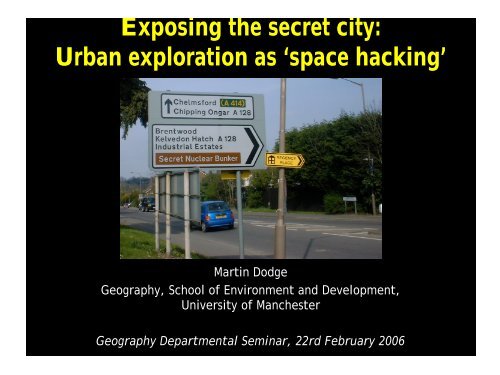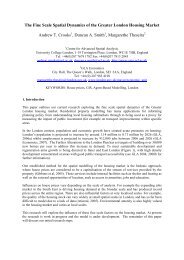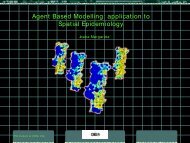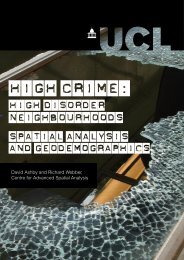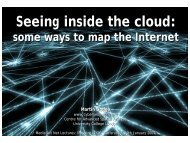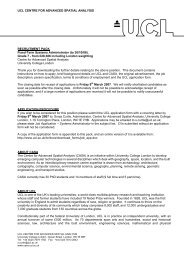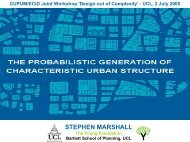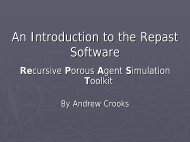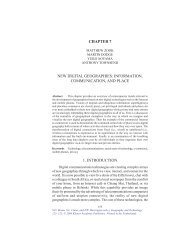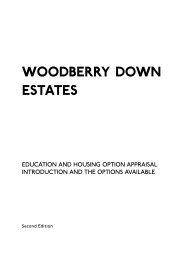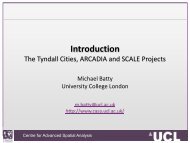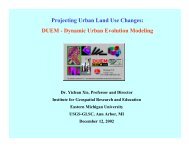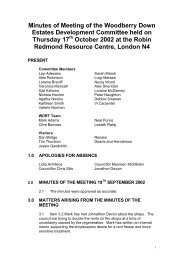Exposing the secret city: Urban exploration as 'space hacking'
Exposing the secret city: Urban exploration as 'space hacking'
Exposing the secret city: Urban exploration as 'space hacking'
You also want an ePaper? Increase the reach of your titles
YUMPU automatically turns print PDFs into web optimized ePapers that Google loves.
<strong>Exposing</strong> <strong>the</strong> <strong>secret</strong> <strong>city</strong>:<strong>Urban</strong> <strong>exploration</strong> <strong>as</strong> ‘space hacking’Martin DodgeGeography, School of Environment and Development,University of ManchesterGeography Departmental Seminar, 22rd February 2006
Outline of <strong>the</strong> talk• defining urban <strong>exploration</strong>• examining <strong>the</strong> accounts of explorers todelineate <strong>the</strong> ethos and ethics• drawing links to computer hacking ethos• defining <strong>the</strong> concept of ‘space hacking’• consider <strong>the</strong> value of ‘space hacking’ forthinking about <strong>the</strong> production of <strong>city</strong> spaces
Defining urban <strong>exploration</strong> (UE)• In cities across <strong>the</strong> world, small groups of urbanexplorers are seeking out <strong>secret</strong> spaces, abandonedbuildings, and o<strong>the</strong>r obscure, overlooked,underused, forgotten, unsafe, and disconnectedbuilt structures.• infiltration• urban spelunking• urban adventure• “extreme historians” (Wilson, 2003)• “off-limits tourism” (Brown, 2001)• “recreational tresp<strong>as</strong>sers”
UE <strong>as</strong> subculture• complex and diverse groups and individuals,but noticeable UE identity• participants refer to ‘urban <strong>exploration</strong>’ <strong>as</strong> acommunity• Importance of <strong>the</strong> Web for forging <strong>as</strong>ubcultural identity from scattered andisolated individuals• consumption of UE <strong>as</strong> ‘weird hobby’ in media• emergence into mainstream• publi<strong>city</strong> is a double-edged sword
Link pages - knitting <strong>the</strong> subculture(www.sub-urban.com)
Situating UEurban<strong>exploration</strong>• factory tours• geocaching• elevator surfing• exploring ruins• train-hoppingurbanadventure• psychogeography• visits to friends’workplaces• ‘open-door’events• exploringabandonments• bunkers and silos• ‘vadding’(steamtunnels)• roofingU.E.• train tunnels• urban climbing,(‘buildering’)• mines• drain-boating/cycling• skateboarding• parkour/freerunning• BASEjumping• ‘Reclaim <strong>the</strong> Streets’type activism• guerrilla gardening• populist archaeology/urban heritage (TimeTeam,RestorationNation, et al)• touringemployeeonlyarea• exploringconstruction site• active buildings• draining• tunnelgames• bridge climbing• counter – media,e.g. spacehijackers• tagging and graffiti• party & pool‘cr<strong>as</strong>hing’• sneaking into moviesand concerts• ‘dogging’ (consensual public sex)Infiltration(Source: adapted from Ninjalicious 2005, 5, with additions.)
Methodology, data sources• sociological concept of ‘accounts’• Scott and Lyman (1968) define a (verbal) ‘account’ to be “<strong>as</strong>tatement made by a social actor to explain unanticipated oruntoward behavior”• 2 types - excuses and justifications• justifications (tactics of neutralisation: denial of injury, denial ofvictim, condemnation of <strong>the</strong> condemners, appeal to loyalties;o<strong>the</strong>r tactics include seeking comp<strong>as</strong>sion through ‘sad tales’ andjustification by right to self-fulfilment)• examined 20 explorers websites (mission logs and photographs) +some interviews in newspapers <strong>as</strong> my empirical ‘accounts’• are important - “represent ways in which people organize views of<strong>the</strong>mselves, of o<strong>the</strong>rs, and of <strong>the</strong>ir social worlds” (Orbuch 1997,455). Publishing <strong>the</strong>se ‘accounts’ is a tactic in <strong>the</strong> presentation ofself (Goffman); a means to “nullify any negative implicationsflowing from appearance or demeanour” (Orbuch 1997, 457)• problematic nature of Web-b<strong>as</strong>ed ‘accounts’, likely to beunrepresentative in one sense, but also valid in this context
Sub-urban’s ‘Account’: re<strong>as</strong>ons (capturing visuals, history, curiosity);<strong>the</strong> problem: “none of <strong>the</strong>m really gr<strong>as</strong>ped <strong>the</strong> idea”Note, <strong>the</strong> ‘Disclaimer’; anonymity - use of pseudonyms + no faces shown
Accounts - justification(www.sminusp.co.uk)
UE socio-spatial ethos• from <strong>the</strong> accounts certain shared ideals areevident:1. need to document space2. thrill of access to forbidden space3. desire for au<strong>the</strong>ntic spaces4. alternative aes<strong>the</strong>ticism of spaces
1. need to document spaces• “Exploration serves no purpose when its results remain obscure.… It w<strong>as</strong> only <strong>the</strong> advent of this publishing tradition thattransformed <strong>the</strong> desultory tresp<strong>as</strong>ses of scattered souls into acoherent movement.”, Jinx Magazine, “Psychopathology and <strong>the</strong>hidden <strong>city</strong>”• “My hope with <strong>the</strong> photos on this site is that <strong>the</strong>y help conveysome of <strong>the</strong> excitement that I find in <strong>the</strong> built environment. Ihope that <strong>the</strong>y convey some of <strong>the</strong> rich and layered history thatexists in <strong>the</strong> places where <strong>the</strong>y have been taken, and help youtoo take a step into <strong>the</strong> p<strong>as</strong>t.”, Steve Duncan, Under<strong>city</strong>.org• does UE provide a viable, relevant means of preservation?• solely <strong>the</strong> importance of peer recognition for ‘discoveries’
2. thrill of access to forbidden spaces• “alot of <strong>the</strong> buzz comes from seeing what many o<strong>the</strong>rscannot ... UE simply would not, by definition, be<strong>exploration</strong> if <strong>the</strong> corridors down which we creep were welltrodden”, Spaceminuspeople• “Stepping into ano<strong>the</strong>r place left untouched by <strong>the</strong> majorityof <strong>the</strong> public is <strong>the</strong> biggest attraction for us, whensomewhere h<strong>as</strong> fulfilled it's purpose, used, closed down and<strong>the</strong> people move on....we move in.”, Trumbernick,www.<strong>exploration</strong>station.co.uk• <strong>the</strong> ‘right’ to be curious
3. desire for au<strong>the</strong>ntic spaces• “Most people think <strong>the</strong> only things worth looking at in ourcities and towns are those safe, sanitized attractions thatrequire an admission fee. …. Ra<strong>the</strong>r than p<strong>as</strong>sively consumingentertainment, urban explorers strive to actually createau<strong>the</strong>ntic experiences by making discoveries that allow <strong>the</strong>mto participate in <strong>the</strong> <strong>secret</strong> workings of cities and structures.”,Ninjalicious, Access All Are<strong>as</strong>• “I w<strong>as</strong> never particularly interested in museums or in‘preserved’ or ‘reconstructed’ artifacts or building. What Ilike about going into inaccessible places is <strong>the</strong> sense that I’mseeing au<strong>the</strong>ntic things - experiencing historical artifactsdirectly -- instead of have <strong>the</strong> mediated experience of readingabout places or seeing things in a museum.”, Steve Duncan,Under<strong>city</strong>.org• why is it more au<strong>the</strong>ntic if its empty (lifeless?), decaying andabandoned? does stillness and disorderliness somehow equateto au<strong>the</strong>nti<strong>city</strong>?
4. alternative aes<strong>the</strong>ticism• “This is a lonesome alien world whose dark corners andpeeling walls have gotten a hold of me and many o<strong>the</strong>rs; thisaffinity for derelict structures and often dangerousexcitement is <strong>the</strong> core essence of urban exploring, in myopinion.”, Mott, Opa<strong>city</strong>.us• beauty in <strong>the</strong> experience of place, e.g. <strong>the</strong> appeal of draining:“We like <strong>the</strong> dark, <strong>the</strong> wet, humid, earthy smell. We like <strong>the</strong>varying architecture. We like <strong>the</strong> solitude. We like <strong>the</strong>acoustics, <strong>the</strong> wildlife, <strong>the</strong> things we find, <strong>the</strong> places we comeup, <strong>the</strong> comments on <strong>the</strong> walls, <strong>the</strong> maze-like quality”,Predator’s approach.doc, Sydney Cave Clan• beauty in <strong>the</strong> subtitle effects of time and nature on structures• uncanny beauty in disorder
UE ethics• ethical principles widely expressed in UE accounts,• defining a kind of ‘pirate’s code’1. respect for places2. publish versus preservation3. freedom of access / illegality of tresp<strong>as</strong>s4. acceptability of anonymity• ethics justify <strong>the</strong>ir activities and provide distinctionto o<strong>the</strong>r users of <strong>the</strong>se spaces: vandals, taggers andgraffiti artists, ‘kids’, arsonists, thieves andcriminals. (position of homeless is unclear)• ethics separate ‘us’ from ‘<strong>the</strong>m’• negates <strong>the</strong> rights claims of property owners andgrants moral authority against security guards
1. respect for places• “What gives UE its higher moral ground than that of plain oldmischief and vandalism is this anti-damage approach. Oh, and<strong>the</strong> pictures.”, Section 61• “You don’t need to take any souvenirs to make both <strong>the</strong>experience and <strong>the</strong> site your own; if anything, you diminishyour ownership of <strong>the</strong> place by defacing it or taking away apiece of it.”, Ninjalicious, Access All Are<strong>as</strong>• “If you really can’t suppress your instinct to mark yourterritory, ple<strong>as</strong>e just wait until you get home and <strong>the</strong>n urinateon your furniture until you get that weird evolutionary misfireout of your system.”, Ninjalicious, Access All Are<strong>as</strong>• <strong>the</strong> spirit of UE parallels ethical stance of eco-tourism: “takenothing but pictures, leave nothing but footprints”• some debate about <strong>the</strong> tagging of discoveries, esp. drains
2. publish versus preservation• <strong>the</strong> necessity to publish brings risks <strong>as</strong> well <strong>as</strong> rewards of peerrecognition• “We will no longer publish location details, o<strong>the</strong>r than <strong>the</strong> nameof <strong>the</strong> establishment itself, and we will endeavour to discouragefur<strong>the</strong>r visits from o<strong>the</strong>r interested parties.”, spaceminuspeople• publi<strong>city</strong> can breed popularity for a site. Copycats andundesirables who don’t respect <strong>the</strong> place• revealing a discovery risks destroying <strong>the</strong> very essence of <strong>the</strong>discovery• encouraging unprepared and stupid people to risk <strong>the</strong>ir lives• invites scrutiny from law enforcement and greater security byproperty owners
3. freedom and illegality• “part of finding <strong>exploration</strong> sites involves c<strong>as</strong>ting off a certainrestrained mindset ... and realizing that many of yourboundaries are self-imposed, voluntary and, ultimately,illusory.”, Ninjalicious, Access All Are<strong>as</strong>• being free in <strong>the</strong> <strong>city</strong>. seeking free access in both senses– free <strong>as</strong> in speech, and free <strong>as</strong> in beer• willingness to ignore ‘no entry signs’ and psychologicalconventions not to open doors marked private• a need to justify tresp<strong>as</strong>sing• curiosity is not a crime. Ninj (quoted in Stevenson, 2000)explains <strong>the</strong> reaction when caught by security guards: “Youexplain to <strong>the</strong>m that you’re just curious. Of course, <strong>the</strong>ynever believe you. They can’t fathom that <strong>the</strong> re<strong>as</strong>on youopen that door w<strong>as</strong> because you wanted to see what w<strong>as</strong>behind it.”
4. acceptability of anonymity• pseudonyms and blurred faces(www.sub-urban.com)
Computer hacking• “Hackers solve problems and build things, and <strong>the</strong>ybelieve in freedom and voluntary mutual help. Tobe accepted <strong>as</strong> a hacker, you have to behave <strong>as</strong>though you have this kind of attitude yourself. Andto behave <strong>as</strong> though you have <strong>the</strong> attitude, youhave to really believe <strong>the</strong> attitude” (Raymond,2005)• diversity of hacker ‘attitudes’:– pranks and clever, inventive actions– breaking into computer networks, cracking software– open source software writers– revealing hidden architectures– questioning authority and received wisdom
Hacker ethic• codification of by Steven Levy (1984):• access to computers - and anything which might teach yousomething about <strong>the</strong> way <strong>the</strong> world works -should be unlimitedand total. Always yield to <strong>the</strong> hands-on imperative• all information should be free• mistrust authority - promote decentralisation• hackers should be judged by <strong>the</strong>ir hacking, not bogus criteri<strong>as</strong>uch <strong>as</strong> degrees, age, race, or position• you can create art and beauty on a computer• computers can change your life for <strong>the</strong> better
‘space hacking’• how far are <strong>the</strong> ethos, ethics and practices of‘hackers’ analogous to urban explorers?• can urban explorers be seen <strong>as</strong> ‘space hackers’?• commonality in <strong>the</strong> ethos– play, inventiveness, producing space– bending, breaking <strong>the</strong> rules– open sourcing knowledge– resisting authority
‘space hacking’• “Through telling new stories <strong>the</strong> unknown,undiscovered <strong>city</strong> can be laid open to criticalscrutiny, to new urban practices, new urbansubversions.” (Pile 2001, 264)1. thinking through how space becomes2. <strong>the</strong> nature of territoriality3. ‘spatial hauntings’4. ‘cities without people’5. ‘<strong>exploration</strong>’ <strong>as</strong> method
1. thinking through howspace becomes• thinking of UE <strong>as</strong> beckoning particular spaces intobeing through embodied practices of ‘spacehacking’• <strong>the</strong> space is performed through spatial practices -by sneaking in, climbing a fence, clambering down adrain, <strong>the</strong> search for good vantage points and <strong>the</strong>composition of photographs• <strong>the</strong> spatial production is different for bored securityguards patrolling, for vandals looking for things tobreak, for owners monitoring <strong>the</strong> space <strong>as</strong>properties on a spreadsheet
2. <strong>the</strong> nature ofterritoriality & property• thinking about how cities are produced <strong>as</strong> ‘property’(spatial fixity) and imagining an urban ‘right-to-roam’(spatial mobility)?• thinking about <strong>the</strong> ethics around <strong>the</strong> illegality of UEperformance might provide insights in what counts <strong>as</strong>public space and how boundaries of place in cities aredemarcated and policed• highlighting <strong>the</strong> extent of normative regulation of spaceand yet also <strong>the</strong> fragility of much territoralization (justignore <strong>the</strong> ‘keep-out’ sign and hop over <strong>the</strong> fence, thustransforming private space, in <strong>the</strong> moment, into aplace of <strong>exploration</strong>)
3. ‘spatial hauntings’• UE <strong>as</strong> a way to think through memory, legacy andau<strong>the</strong>nti<strong>city</strong>• <strong>the</strong> experience of place <strong>as</strong> opposed to writtenhistories/testimonies, <strong>as</strong> a way complementingo<strong>the</strong>r representations• experiencing and <strong>the</strong>n capturing in photographs <strong>the</strong>layers of memories in a place (memorialisation)• thinking about <strong>the</strong> uncanny nature of spaces, <strong>the</strong>psychogeographies of <strong>the</strong> <strong>city</strong>
4. cities without people• nearly all UE is of ‘empty’ space - functional orabandoned spaces• ‘space hacking’ produces ‘cities without people’• one UE ‘account’ is called ‘spaceminuspeople’• this reveals <strong>the</strong> fragility of built structures and <strong>the</strong>ability of nature to break down orderliness of cities• perhaps a way of thinking post-human urbanity?what happens to space when people stop caring in<strong>the</strong> normative sense; when entropy runs unchecked
5. ‘<strong>exploration</strong>’ <strong>as</strong> method“No one explores cities if geographers do not.”, William Bunge,(1973, 335)• can expeditionary practices open up ways of knowing thatcapture (at le<strong>as</strong>t partially) <strong>the</strong> fragmentary nature of places,<strong>the</strong> unknowing permeating through <strong>city</strong>, that o<strong>the</strong>r methodsfail to capture• research becoming risky, finding things out becomes fun. UE <strong>as</strong>‘post-method’ method, working without permission, withoutrisk <strong>as</strong>sessments, without ethical approval• expeditions to study <strong>the</strong> non-obvious urbanity• “not just <strong>the</strong> recreation land, but <strong>the</strong> blighted land; not just<strong>the</strong> affluent, but <strong>the</strong> poor; not just <strong>the</strong> beautiful, but <strong>the</strong>ugly” (Bunge 1977, 35)
Conclusions• computer hacking provides a way of thinkingabout UE• UE seems to provide an interesting set ofspatial practices through which to explore arange of geographic issues such <strong>as</strong>– production of space, territoriality andproperty, memory and place, geographicknowledge• on-going research is seeking to flesh out<strong>the</strong>se ide<strong>as</strong>
Questions and suggestions• photograph credits. Many thanks to Siologen(http://siologen.net), Jondoe (www.sub-urban.com)
• bibliography:– Brown J, 2003, “Online and underground” Salon.com, January 16,– Marsden R, 2005, “Asylum seekers”, The Independent, July 4, page 37– Ninjalicious, 2005 Access All Are<strong>as</strong>: A User's Guide to <strong>the</strong> Art of <strong>Urban</strong>Exploration(Infilpress, Canada)– Orbuch T L, 1997, “People’s accounts count: The sociology of accounts” AnnualReview of Sociology 23 455-478– Pile S, 2001, “The un(known) <strong>city</strong>… or, an urban geography of what lies buried below<strong>the</strong> surface” in Borden I, Kerr J, Rendell J, Pivaro A (eds), The Unknown City:Contesting Architectural and Social Space (MIT Press, Cambridge, MA) 262-278– Scott M B, Lyman S M, 1968, “Accounts” American Sociological Review 33(1) 46-62– Wilson H, 2003, “Pipe down” The Guardian, The Guide section , July 5, pages 8-10


